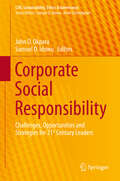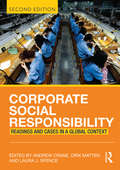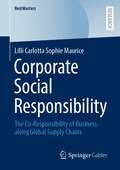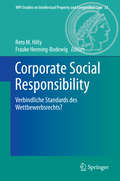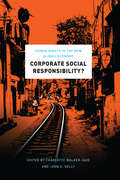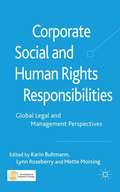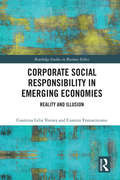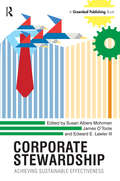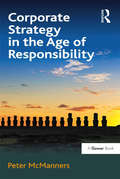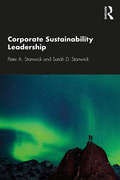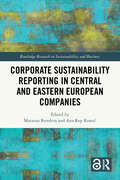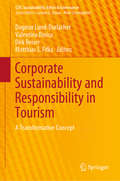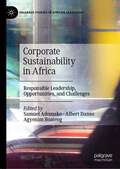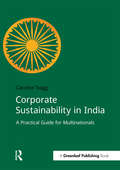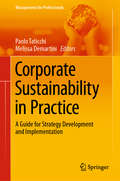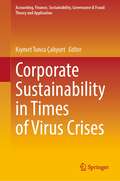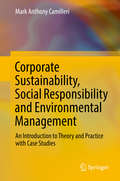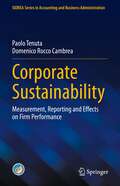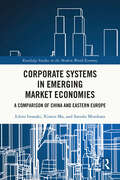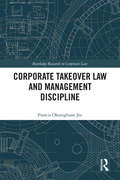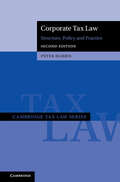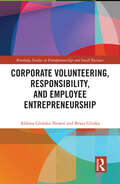- Table View
- List View
Corporate Social Responsibility: Challenges, Opportunities and Strategies for 21st Century Leaders (CSR, Sustainability, Ethics & Governance)
by Samuel O. Idowu John O. OkparaIn today's global business environment it is no longer acceptable that a corporation does well simply by doing good. It is expected. With increasing pressures from stakeholders to improve the bottom line as well as to be good corporate citizens, business leaders face tough decisions. What social issues should we support? What initiatives should we develop that will do the most good for the company as well as the cause? Do we include social messages in our advertising, encourage our employees to volunteer, do we modify our business practices? How do we integrate a new initiative into current strategies? These and other challenges will continue to face future leaders. This book provides thoughtful answers to these important questions, and to many more. The book offers suggestions on how to choose among major worthy causes and also how to measure the amount of good achieved both for the recipients and the companies themselves. Of course, all is not only about challenges, there are loads of opportunities that go along with them but it's only responsible and sustainable leaders who would be able to spot these opportunities. That is the future which awaits 21st century leaders.
Corporate Social Responsibility: Readings and Cases in a Global Context
by Dirk Matten Laura Spence Andrew CraneAs a relatively young subject matter, corporate social responsibility has unsurprisingly developed and evolved in numerous ways since the first edition of this textbook was published. Retaining the features which made the first edition a top selling text in the field, the new edition continues to be the only textbook available which provides a ready-made, enhanced course pack for CSR classes. Authoritative editor introductions provide accessible entry points to the subjects covered - an approach which is particularly suited to advanced undergraduate and postgraduate teaching that emphasises a research-led approach. New case studies are integrated throughout the text to enable students to think and analyze the subject from every angle. The entire textbook reflects the global nature of CSR as a discipline and further pedagogical features include chapter learning outcomes; study questions; ‘challenges for practice’ boxes and additional ‘further reading’ features at the end of each chapter. This highly rated textbook now also benefits from a regularly updated companion website which features a brand new 'CSR Case Club' presenting students and lecturers with further case suggestions with which to enhance learning; lecture slides; updates from the popular Crane and Matten blog, links to further reading and career sites, YouTube clips and suggested answers to study questions. An Ivey CaseMate has also been created for this book at https://www.iveycases.com/CaseMateBookDetail.aspx?id=335.
Corporate Social Responsibility: The Co-Responsibility of Business along Global Supply Chains (BestMasters)
by Lilli Carlotta MauriceThis book attempts to clarify the social responsibility of business along global supply chains beyond mere profit maximisation as famously argued by Milton Friedman. In this context, corporate social responsibility (CSR) is understood as the responsibility of business to align corporate policies and procedures with commonly accepted ethical standards and to respect stakeholders’ rights in day-to-day business. As such, CSR is by no means voluntary but constitutes a fundamental prerequisite for companies to keep their license to operate for sustainaable growth and survival in an ever more competitive global market. Inspired by Germany' recent efforts to regulate global supply chains, Germany's Due Diligence Act is analysed in terms of its potential and limitations to promote responsible business practices and complemented by alternative approaches for more co-responsibility of business globally.
Corporate Social Responsibility: Verbindliche Standards des Wettbewerbsrechts? (MPI Studies on Intellectual Property and Competition Law #21)
by Reto M. Hilty Frauke Henning-BodewigIm Zuge der Finanz- und Wirtschaftskrise wird verstärkt diskutiert, welcher Mechanismen es bedarf, um die Interessen aller Marktteilnehmer im Wirtschaftsleben zu wahren. Große Bedeutung gewonnen hat dabei der Aspekt der ,,business ethics". So richten immer mehr Unternehmen sog. Compliance-Abteilungen ein, die die Einhaltung von unternehmensinternen Grundsätzen wie namentlich die der ,,Corporate Social Responsibility" (CSR) zur Aufgabe haben. Kaum untersucht ist bislang jedoch die rechtliche Verbindlichkeit solcher CSR-Standards, obgleich sie zunehmend von Unternehmen auf ihrer Website verkündet oder auf anderem Wege zu Public Relations- und Marketingzwecken - bis hin zur Werbung - eingesetzt werden. Sind CRS damit nur wohlklingende Absichtserklärungen, oder handelt es sich um rechtlich verbindliche Standards - und wenn ja, unter welchen Voraussetzungen entsteht ein Rechtsanspruch gegen Unternehmungen, wenn diese die sich selbst gegebenen Standards nicht einhalten? Anders gefragt: Gibt es ein ,,corporate right to lie", oder setzt das (deutsche, europäische, internationale) Recht Grenzen? Im Fokus steht hierbei das Recht zur Bekämpfung unlauteren Wettbewerbs, im deutschen Sprachgebrauch kurz auch Lauterkeitsrecht genannt, das in allen entwickelten Wirtschaftsnationen - wenn auch mit unterschiedlichem Ansatz - Markthandlungen unter dem Gesichtspunkt der ,,Fairness" überprüft. Die Autoren der Beiträge dieses Buches sind ausgewiesene Fachleute des Europa-, Wirtschafts- und Wettbewerbsrechts. Sie diskutieren auf der Grundlage rechtstatsächlicher Erkenntnisse alle mit der wettbewerbsrechtlichen Beurteilung von CSR zusammenhängenden Fragen, insbesondere unter Berücksichtigung der Rolle, die CSR für Unternehmen, Abnehmer und die Gesamtwirtschaft spielt. Auch die Vorstellungen anderer Rechtsordnungen und Kulturkreise sind einbezogen. Gefragt wird letztlich, ob es ein Unternehmerleitbild gibt, das die Beachtung ethischer Standards einschließt und das über das Lauterkeitsrecht auch rechtliche Verbindlichkeit erlangt. Mit Keynote von Gesine Schwan.
Corporate Social Responsibility?: Human Rights in the New Global Economy
by John D. Kelly Charlotte Walker-SaidWith this book, Charlotte Walker-Said and John D. Kelly have assembled an essential toolkit to better understand how the notoriously ambiguous concept of corporate social responsibility (CSR) functions in practice within different disciplines and settings. Bringing together cutting-edge scholarship from leading figures in human rights programs around the United States, they vigorously engage some of the major political questions of our age: what is CSR, and how might it render positive political change in the real world? The book examines the diverse approaches to CSR, with a particular focus on how those approaches are siloed within discrete disciplines such as business, law, the social sciences, and human rights. Bridging these disciplines and addressing and critiquing all the conceptual domains of CSR, the book also explores how CSR silos develop as a function of the competition between different interests. Ultimately, the contributors show that CSR actions across all arenas of power are interdependent, continually in dialogue, and mutually constituted. Organizing a diverse range of viewpoints, this book offers a much-needed synthesis of a crucial element of today's globalized world and asks how businesses can, through their actions, make it better for everyone.
Corporate Social Strategy
by Bryan W. Husted David Bruce AllenCan good-will be good business? Firms are increasingly called upon to address matters such as poverty and human rights violations. The demand for corporate social responsibility (CSR) is directed mainly at top management in multinational corporations who are reminded that, in addition to helping to make the world a better place, their commitment to social action will be rewarded by lasting customer loyalty and profits. But is it true that firms that engage in social action will be rewarded with a good name, competitive advantage, superior profits and corporate sustainability? What if it is true for some firms and not for others? This book addresses these and other questions by explaining the how and why of creating value and competitive advantage through corporate social action. It shows how and when firms can develop successful corporate social strategies that establish strong commitments to shareholders, employees and other stakeholders.
Corporate Social and Human Rights Responsibilities
by Mette Morsing Karin Buhmann Lynn RoseberryThis book challenges the separation between CSR and law. It also demonstrates that BRHR may be gradually separating from CSR through emphasis on state obligations. Authors from around the world discuss how businesses engage in CSR and human rights, and how governments and intergovernmental organisations may support business in taking responsibility
Corporate Social in Emerging Economies: Reality and Illusion (Routledge Studies in Business Ethics)
by Cosmina Lelia Voinea Cosmin FratostiteanuOver the last few decades, emerging markets have increased their share in world GDP and have come to play a prominent and growing role in global business. Their period of impressive growth was triggered by major global advances such as economic liberalization and governance reforms and deregulation. As governments and policy makers have permitted global competition from the more advanced, developed world, the prospect of millions of consumers in developing countries not only encourages locals to start businesses, but also appeals to multinational enterprises overseas. The growing presence of emerging markets on the world stage has not been left unnoticed and many investors have contributed significant amounts of capital with the hope of receiving major financial gains. In this context, emerging markets are particularly facing sustainability challenges due to their fast growing pace and fuzzy or inexistent sustainability regulations. Corporate Social Responsibility in Emerging Economies represents a realistic critical overview of the state of affairs of CSR in the context of an emerging economy. It is an accessible and comprehensive diagnostic point of reference for the academic world as well as for policy makers. The topic of CSR is highly relevant for the business world and a challenging subject for the theory and literature. This is a unique book that offers new empirical insights for policy makers and scholars of the fields of CSR, Business Ethics, Organizational Studies and related disciplines
Corporate Sovereignty: Law and Government under Capitalism
by Joshua BarkanRefinery explosions. Accounting scandals. Bank meltdowns. All of these catastrophes—and many more—might rightfully be blamed on corporations. In response, advocates have suggested reforms ranging from increased government regulation to corporate codes of conduct to stop corporate abuses. Joshua Barkan writes that these reactions, which view law as a limit on corporations, misunderstand the role of law in fostering corporate power.In Corporate Sovereignty, Barkan argues that corporate power should be rethought as a mode of political sovereignty. Rather than treating the economic power of corporations as a threat to the political sovereignty of states, Barkan shows that the two are ontologically linked. Situating analysis of U.S., British, and international corporate law alongside careful readings in political and social theory, he demonstrates that the Anglo-American corporation and modern political sovereignty are founded in and bound together through a principle of legally sanctioned immunity from law. The problems that corporate-led globalization present for governments result not from regulatory failures as much as from corporate immunity that is being exported across the globe. For Barkan, there is a paradox in that corporations, which are legal creations, are given such power that they undermine the sovereignty of states. He notes that while the relationship between states and corporations may appear adversarial, it is in fact a kind of doubling in which state sovereignty and corporate power are both conjoined and in conflict. Our refusal to grapple with the peculiar nature of this doubling means that some of our best efforts to control corporations unwittingly reinvest the sovereign powers they oppose.
Corporate Stewardship: Achieving Sustainable Effectiveness
by Susan Albers Mohrman Edward E. Lawler III James O'TooleStewardship entails a profound understanding and acceptance of the challenges that result from the organization’s interdependence with the societal and ecological contexts in which it operates—and of what it takes to embrace the challenges to be a force for building a viable future. This book dares to ask ‘why’ business leaders should embrace stewardship in the current market where profit reigns supreme. A shift in approach represents fundamental change for the corporate world, and even the most advanced corporations consider themselves to be in the starting block of this transition. The book sets out the practical ways in which corporate stewardship can be achieved through embedding new approaches across the different functions of a business. This book, written by the leading thinkers in sustainability research, provides practical guidance on how companies can resolve the paradoxical challenges they face. How can they be at the same time profitable and responsible, effective and ethical, sustainable and adaptable? It explores what businesses are doing, what they can and should do to effectively respond to external challenges, and focuses on how leaders can create cultures, strategies, and designs far beyond “business as usual”.Stewards must not only make proper current use of that which they hold in trust, they also must leave it in better condition for use by future generations. Corporate Stewardship challenges managers, executives, and directors of global corporations to think and act as stewards of both their organizations and the physical and social environments in which they operate.
Corporate Strategy in the Age of Responsibility
by Peter McMannersAs the era of ever expanding markets and ample resources ends, governments and business will have to behave differently. The world is facing weak economic growth, limits to affordable resources and increasing concerns about environmental consequences. During the boom times, governments championed de-regulation and business responded by adopting an anything-goes attitude. In these straitened times, strategic analysis has to engage with the challenges that society faces to create resilient corporations fit for the 21st century. In Corporate Strategy in the Age of Responsibility, Peter McManners, who has for nine years run strategy workshops on the Henley MBA focusing on the global business environment, sets about providing a strategic framework for navigating the new economic environment. Chief Sustainability Officers (CSOs) now exist, but they struggle to find the strategic rationale for the improvements they champion. The author argues that their good intentions often lack traction, partly because others in management don’t get it, but also because they are not ambitious enough. The book is not about preaching semi-charitable behaviour or how to enhance the reputation of the corporation instead it is about surviving and thriving in a challenging and changing environment. A corporate audience familiar with strategy books will relate to this book, but will find it steers them towards radically new strategic thinking suitable for a turbulent period of transition.
Corporate Sustainability Leadership
by Peter A. Stanwick Sarah D. StanwickCorporate sustainability, now regarded as a vitally important topic on the agenda for businesses, has in recent years not only become embedded in postgraduate study, but is now also widely taught at the undergraduate level in business schools. Corporate Sustainability Leadership reflects the growing need for an accessible text at all levels of study. The book brings the topic of corporate sustainability fully up to date by incorporating new directions in the areas of corporate responsibility and sustainability. Written by the authors of the highly successful Understanding Business Ethics, this book provides a primary resource for any undergraduate or graduate corporate sustainability class. Unlike other textbooks in corporate sustainability, which are often edited collections from multiple authors, this book develops themes throughout each chapter using a consistent voice to ensure an integrative learning experience for both students and instructors. With ten chapters and ten cases, all of which are supplemented with online test banks, instructor guides, and PowerPoint slides, this textbook provides enough content for a complete class on corporate sustainability. Using stakeholder theory as a foundation, Corporate Sustainability Leadership allows readers to develop a better understanding of how organizations can effectively satisfy the needs of their critical stakeholders. It addresses the issues of corporate sustainability from both a micro and macro perspective. Micro issues related to corporate sustainability include leadership, organizational change, management decision making, human resource organizational strategies, organizational ethics, organizational culture, corporate sustainability reporting, corporate sustainability performance, and corporate compliance. The macro issues addressed include suppliers, corporate sustainability communications, consumers, the natural environment, governments, NGOs, and the developing world. In addition, there are ten unique company cases from organizations that are household names, such as Bayer, Shell, Volkswagen, and Dow Chemical.
Corporate Sustainability Reporting in Central and Eastern European Companies (Routledge Research in Sustainability and Business)
by Marzena Remlein Ana Rep RomićThis book comprehensively analyses non-financial reporting, specifically sustainability reporting, in Central and Eastern European (CEE) countries. It identifies key trends and common practices among regional companies.The book examines the comprehensiveness and quality of sustainability reporting across fifteen countries by drawing on academic literature, regulatory reports, corporate sustainability disclosures, and scientific studies. The authors explore the benefits of sustainability reporting, including enhanced stakeholder trust, improved reputation, and stronger commitments to environmental, social, and governance practices. Additionally, the book highlights the link between sustainability reporting and improved financial performance. Practical recommendations are provided to help companies in the CEE region align their reporting practices with the latest Corporate Sustainability Reporting Directive (CSRD) requirements.This monograph is an invaluable resource for students and scholars of sustainability reporting, corporate social responsibility, and sustainable business. It is equally essential for professionals and companies seeking to enhance their sustainability reporting and compliance in the CEE region.
Corporate Sustainability and Responsibility in Tourism: A Transformative Concept (CSR, Sustainability, Ethics & Governance)
by Matthias S. Fifka Dagmar Lund-Durlacher Dirk Reiser Valentina DinicaThis book offers essential insights into how the world's second largest industry, tourism, is responding to challenges involved in expanding the corporate social responsibility (CSR) concept to corporate sustainability and responsibility, referred to as CSR 2.0. It analyzes the typical setup of tourism with various types of commercial agents: corporations, small and medium sized enterprises, public-private partnerships, social enterprises and local cooperatives. In addition, the book examines a broad range of voluntary initiatives, the effectiveness of these efforts, and how contextual and wider policy features shape these relationships. The book is divided into three parts, the first of which elaborates on strategic drivers and rationales for CSR. In turn, the second part introduces readers to design approaches for CSR programs and envisaged impacts, while part three focuses on implementation, certification, reporting, and possible outcomes. Each part offers a mixture of theoretical perspectives, synthesis analyses and case studies. The respective chapters tackle a broad spectrum of tourism sub-sectors, e.g. the cruise industry, aviation, gastronomy, nature-based tourism, and urban destinations.
Corporate Sustainability in Africa: Responsible Leadership, Opportunities, and Challenges (Palgrave Studies in African Leadership)
by Agyenim Boateng Samuel Adomako Albert DansoThis book addresses empirical, theoretical, and policy perspectives in its examination of the development of sustainability management of African firms. Documenting cases of sustainable activities across Africa and accelerating knowledge about the opportunities and challenges facing firms operating in Africa, the chapters examine various aspects of sustainability and sustainable entrepreneurship/innovations in the African context. The authors seek to understand how African nations can be positioned to meet the 2030 Sustainable Development Goals as well as the innovative strategies necessary to improve sustainability practices of African firms for greater success. With guidance for scholars and policymakers, this book will serve as a valuable resource, providing readers with an up-to-date and contextual understanding of sustainability practices, drivers, and challenges in Africa.
Corporate Sustainability in India: A Practical Guide for Multinationals (DoShorts)
by Caroline TwiggThis short guide offers practical insights for companies or foundations who want to run their business in India in a sustainable way.In this concise, expert guide, Caroline Twigg draws on her experience of setting up the India office for the World Business Council for Sustainable Development. She starts with a brief overview of India's history, culture and relationship with the environment, presents an overview of doing business in India in general, and then covers: policy and regulations that influence sustainability actions in India; how sustainability is interpreted in India and how that may impact a company's engagement; how companies already work on sustainability and what might come in the future; a valuable list of the organizations and resources that will help you deliver on your business and sustainability goals.If you work for an international company based outside of India, if you run a foundation with projects in India, if you have products or services with a sustainability focus and are hoping to expand your business in India, or if you are tasked with communicating your company's sustainability work in India, this book will help you engage with your partners respectfully, effectively and easily.
Corporate Sustainability in Practice: A Guide for Strategy Development and Implementation (Management for Professionals)
by Paolo Taticchi Melissa DemartiniBuilding better organisations, with a clear sense of purpose, is a common challenge faced by many entrepreneurs and executives in industry. A fully integrated corporate sustainability strategy can help organisations to better manage risks, to win business opportunities and to ultimately strengthen reputation. Building on the experience of renowned strategists, sustainability, finance and academic experts, this book offers practical tools and approaches that can be used to develop and implement fully integrated corporate sustainability strategies.
Corporate Sustainability in Times of Virus Crises (Accounting, Finance, Sustainability, Governance & Fraud: Theory and Application)
by Kıymet Tunca ÇalıyurtThis book analyses the effect of biological risk on business and management by considering case studies from Malaysia, Lebanon, and G20 countries during the COVID-19 pandemic. Covering a wide range of topics, such as effects of virus risk on corporate sustainability, COVID-19 and CSR activities, governance practices and regulations for derivative products in emerging markets, risk management during a pandemic, and AI applications in the health sector, this book assists top management in redesigning business models and organisational management in a post-pandemic world and in becoming better equipped to tackle future biological risks or pandemic events.
Corporate Sustainability, Social Responsibility and Environmental Management: An Introduction to Theory and Practice with Case Studies (Csr, Sustainability, Ethics And Governance Ser.)
by Mark Anthony CamilleriThis book provides a concise and authoritative guide to corporate social responsibility (CSR) and related paradigms, including environmental responsibility, corporate sustainability and responsibility, creating shared value, strategic CSR, stakeholder engagement, corporate citizenship, business ethics and corporate governance, among others. It is primarily intended for advanced undergraduate and / or graduate students. Moreover, it is highly relevant for future entrepreneurs, small business owners, non-profit organisations and charitable foundations, as it addresses the core aspects of contemporary strategies, public policies and practices. It also features case studies on international policies and principles, exploring corporate businesses’ environmental, social and governance reporting.“Mark Camilleri’s new book provides an excellent overview of the eclectic academic literature in this area, and presents a lucid description of how savvy companies can embed themselves in circular systems that reduce system-wide externalities, increase economic value, and build reputation. A valuable contribution.”Charles J. Fombrun, Founder of Reputation Institute and a former Professor of Management at New York University and The Wharton School, University of Pennsylvania, USA“I am pleased to recommend Dr. Camilleri’s latest book, Corporate Sustainability, Social Responsibility, and Environmental Management. The book is a rich source of thought for everyone who wants to get deeper insights into this important topic. The accompanying five detailed case studies on a wide array of corporate sustainable and responsible initiatives are helpful in demonstrating how theoretical frameworks have been implemented into practical initiatives. This book is a critical companion for academics, students, and practitioners.”Adam Lindgreen, Professor and Head of Department of Marketing, Copenhagen Business School, Denmark“This book is an essential resource for students, practitioners, and scholars. Dr. Mark Camilleri skillfully delivers a robust summary of research on the business and society relationship and insightfully points to new understandings of and opportunities for responsible business conduct. I highly recommend Corporate Sustainability, Social Responsibility, and Environmental Management: An Introduction to Theory and Practice with Case Studies."Diane L. Swanson, Professor and Chair of Distinction in Business Administration and Ethics Education at Kansas State University, KS, USA"Mark’s latest book is lucid, insightful, and highly useful in the classroom. I strongly recommend it."Donald Siegel, Dean of the School of Business and Professor of Management at the University at Albany, State University of New York, NY, USA“The theory and practice of corporate sustainability, social responsibility and environmental management is complex and dynamic. This book will help scholars to navigate through the maze. Dr Camilleri builds on the foundations of leading academics, and shows how the subject continues to evolve. The book also acknowledges the importance of CSR 2.0 - or transformative corporate sustainability and responsibility - as a necessary vision of the future.”Wayne Visser, Senior Associate at Cambridge University, UK. He is the author of CSR 2.0: Transforming Corporate Sustainability & Responsibility and Sustainable Frontiers: Unlocking Change Through Business, Leadership and Innovation"Corporate Sustainability, Social Responsibility and Environmental Management: An Introduction to Theory and Practice with Case Studies" provides a useful theoretical and
Corporate Sustainability: Measurement, Reporting and Effects on Firm Performance (SIDREA Series in Accounting and Business Administration)
by Paolo Tenuta Domenico Rocco CambreaThis book introduces readers to the main types of corporate sustainability practices. The first section examines both the ratings provided by international agencies and the various ESG (Environmental, Social and Government) indexes existing at 2021. In turn, the second part empirically investigates the relationship between the level of corporate sustainability and corporate financial performance among the large companies listed on the Milan Exchange FTSE-MIB 40 index for 2015-2019. The book offers a comprehensive overview of current sustainability concepts and practices and illustrates how various companies are seeking to integrate them in their competitive strategy. Further, it fills a gap in the extant literature by analysing the origins, historical evolution and structure of the main rating agencies and ESG indexes. In addition, the empirical analysis of corporate sustainability’s impact on companies’ financial performance reveals the importance of collegial leadership – a commonly found feature of Italian family businesses that has not been considered in previous studies – as a moderating factor for reconciling sustainability initiatives and performance at family-run firms.
Corporate Systems in Emerging Market Economies: A Comparison of China and Eastern Europe (Routledge Studies in the Modern World Economy)
by Ichiro Iwasaki Xinxin Ma Satoshi MizobataThis book provides a comparative perspective of various areas of corporate management in two post-socialist regions: China and Eastern Europe.The book employs original firm-level empirical analyses and meta-analyses of the extant literature to investigate the impacts of corporate ownership on firm performance and organizational behavior; internal organization through the lens of the corporate board; and the interrelationship between firms and gender, labor relations, and society. In comparing China and Eastern Europe, the book addresses whether corporate governance structures have evolved due to global pressures from competition and technological progress or if inter-regional differences reflect how firms were privatized or handed over to managers after the end of central planning.This book will appeal to researchers and post-graduate students interested in comparative economics, economic system transition, and comparative corporate systems.
Corporate Takeover Law and Management Discipline (Routledge Research in Corporate Law)
by Francis A Okanigbuan JnrThis book examines the effectiveness of corporate takeovers. The dominant ideologies of corporate takeovers include synergistic gains and its managerial disciplinary role. These dominant themes are being undermined by the challenges of costly acquisitions. The UK Takeover Code is a regulatory response to the role of managers of target companies only. Also, the regulatory framework for takeovers in the United States is largely focused on target companies. The book demonstrates that managements can influence the role of takeovers, thereby undermining its synergistic and disciplinary values. Presenting an identification and evaluation of the limits of current regulatory and judicial control over the role of management during takeovers in the UK and the US -Delaware, it will identify the relevance of institutional control as an effective mechanism for addressing the challenges of managerial influence over takeover functions. It will also identify how the role of managements can be addressed with the complementary benefit to shareholder and employee interests; thereby challenging the shareholder/ stakeholder primacy debate in corporate law, particularly in relation to takeovers. This book will be essential reading for scholars and students interested in the market for corporate control, corporate law and company law.
Corporate Tax Law: Structure, Policy and Practice (Cambridge Tax Law Series)
by Peter HarrisNew edition taking account of the substantial developments of the last decade. It considers the Trump US tax reforms of late 2017 and then the Biden reforms of 2022. It recognises the economic rise of China by incorporating its corporate tax system for comparison. This creates increased balance, introducing a second civil law jurisdiction. This edition also incorporates many changes resulting from international tax developments including the Base Erosion and Profit Shifting reports and the current Two Pillar approach. The edition documents how corporate and international tax systems are increasingly integrated. This is particularly the case with minimum taxes, hybrid financial instruments and excessive debt financing. The interface between corporate tax base and financial accounts is another area of particular interest. Countries continue to tinker with the use of corporate losses, corporate tax rates and dividend relief. Other areas of development include corporate tax subjects, buy backs and dividend stripping.
Corporate Volunteering, Responsibility and Employee Entrepreneurship (Routledge Studies in Entrepreneurship and Small Business)
by Beata Glinka Aldona Glińska-NeweśSupporting employee entrepreneurship is among major challenges contemporary organizations face. Many facets of corporate entrepreneurship are investigated, and the body of knowledge in the field is growing rapidly; nevertheless, there are still knowledge and research gaps to be filled. Notably, while there are studies linking HRM with corporate entrepreneurship, studies on connections between CSR-oriented practices and corporate/employee entrepreneurship are to be developed. The main goal of this book is to explain relationships between corporate volunteering and employee entrepreneurship in organisations. The book combines two extremely vivid fields of research: entrepreneurship and corporate social responsibility. Based on their own research, the authors present how participation in corporate volunteering, as one of the CSR practices in organisations, leads to strengthening employee entrepreneurial behaviour. The book offers a framework showing the role of CSR practices in shaping entrepreneurial and innovative employees’ behaviour. This book is aimed mainly at postgraduates, researchers and academics in the fields of entrepreneurship and corporate volunteering. As it touches vital fields of managerial education and management, it will also be of interest to master level students at universities or business schools as well as business practitioners.
Corporate Volunteering, Responsibility and Employee Entrepreneurship (Routledge Studies in Entrepreneurship and Small Business)
by Beata Glinka Aldona Glińska-NeweśSupporting employee entrepreneurship is among major challenges contemporary organizations face. Many facets of corporate entrepreneurship are investigated, and the body of knowledge in the field is growing rapidly; nevertheless, there are still knowledge and research gaps to be filled. Notably, while there are studies linking HRM with corporate entrepreneurship, studies on connections between CSR-oriented practices and corporate/employee entrepreneurship are to be developed.The main goal of this book is to explain relationships between corporate volunteering and employee entrepreneurship in organisations. The book combines two extremely vivid fields of research: entrepreneurship and corporate social responsibility. Based on their own research, the authors present how participation in corporate volunteering, as one of the CSR practices in organisations, leads to strengthening employee entrepreneurial behaviour. The book offers a framework showing the role of CSR practices in shaping entrepreneurial and innovative employees’ behaviour.This book is aimed mainly at postgraduates, researchers and academics in the fields of entrepreneurship and corporate volunteering. As it touches vital fields of managerial education and management, it will also be of interest to master level students at universities or business schools as well as business practitioners.
